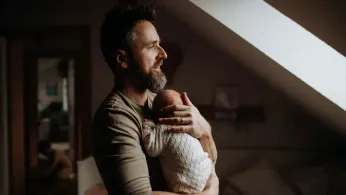
September 1, 2025
Solo Parenting and IVF
Kilian Melloy READ TIME: 1 MIN. SPONSORED
Fertility treatments like IUI and IVF are an increasingly popular option for LGBTQ+ people looking to become parents. Queer couples turn in ever-greater numbers to clinics like those in The Prelude Network, North America’s largest and fastest-growing fertility care network, and for good reason: the clinics comprising The Prelude Network focus on treating all families with respect and providing personalized care that addresses each patient's unique needs.
But committed couples aren’t the only ones welcoming their own genetically related children into loving homes. Solo prospective parents, too, answer the call to family building through IVF.
There are many paths to solo parenthood. Some, like adoption, do not involve a genetic connection to children; for those who want that genetic tie, it can be guaranteed by way of procedures like IUI and IVF.
Understanding Your Options

Source: Getty
Intrauterine insemination (IUI) involves introducing sperm directly into the uterus after ovarian stimulation and the development of a mature egg, increasing fertilization chances. Patients may use sperm from a known donor — often a relative or close friend — or from anonymous donors through sperm banks.
In vitro fertilization (IVF) works differently, uniting sperm and egg under laboratory conditions. The resulting embryos develop for several days, undergo genetic testing if desired, and are then either implanted into the patient's uterus, transferred to a gestational surrogate, or frozen for future use.
"We always talk about all the options," says Dr. William Ziegler of the Reproductive Science Center Of New Jersey "But it really comes down to the reason why they're in our office. If adoption was something they were considering, they probably would not be in our office."
“I have good friends with families made in many different ways,” Egon Orion, the Executive Director of Seattle Pride says. “But if we're talking about adoption and IVF, I know couples that have gone both in both directions, so I’ve been able to see what their journey has been like.”
Orion was nearly 50 when he began the journey that made him a parent with the arrival of his son. “I chose IVF because it was a little more of a straightforward path. I think there's a little more in the way of ups and downs on the adoption path. And I think that people think that adoption is also cheap, but adoption can be quite expensive as well, so I chose based on my age and having a little more of a sure outcome in the short term.”
That line of reasoning is not uncommon, Dr. Ziegler notes. “Patients say, ‘Okay, what's going to give me the highest success rate?’ Well, that's going to be in vitro fertilization.” That logic applies, too, to the financial aspect of fertility care: “Sometimes a patient comes in and they have a limited amount of money to spend, and they want the biggest bang for their dollar, and that's going to be in vitro fertilization." But, he cautions, going straight to IVF may not be possible in all cases when it comes to solo prospective parents with wombs. “Some insurance companies mandate that you have to do three inseminations before they will cover in vitro fertilization” he notes.
That was not an option for Orion, of course. “I don't have a uterus,” Orion points out, “and I'm gay, and I wanted to have biological children, so IVF was really the only reasonable path for me to take.”
Guiding with Compassion and Expertise

Source: Getty
Dr. Ziegler understands that it’s best to let the prospective parent do the driving, with his role that of a guide and problem solver. "When they walk in here, it's like, 'Okay, how can we help you?' I let the patient tell me what they're thinking of doing, and then we map out what we need to do."
He emphasizes the importance of long-term family planning when choosing treatments. "What is your long-term plan? Are you looking to have two, three, or four children?" he asks patients. "If that's the case, then going to IVF, doing an embryo transfer, and then freezing any extra embryos would be beneficial, because by the time you come back to me, you're going to be older."
The age factor is crucial. "The eggs that I retrieve at your age now are going to be younger than what we would harvest in five years," Dr. Ziegler explains. Embryos created and preserved now will effectively be "five years younger" than those made with eggs retrieved half a decade hence, significantly boosting pregnancy success rates.
For Orion, now 53 and preparing for a second child, this flexibility is invaluable. "IVF gives you a lot of control over how you want to proceed in having kids," he says. "You can do genetic testing on the embryos; you can freeze and store the ones you don't implant; you can donate unused embryos to others."
Indeed, Orion is preparing to welcome another child. “If I'm going to have a second child, it really needs to be in the near future so that I have enough strength and energy during both of their childhoods and adolescent years,” he says. “I'm in the process of searching for surrogate right now, and would like to do an embryo transfer end of the year or the beginning of next year.
“There were complications for her pregnancy,” Orion adds, explaining why he needs to search out a different surrogate this time, “and she had to get a hysterectomy once my son was born, so she was unable to do it for my second child. But she said to me if she were able to, she would do it in a heartbeat. That tells you a little bit about our relationship. It was just a lovely experience. There's a lot of trust that goes into that process, and there's a lot of love that's generated through that process, regardless of financial compensation for the surrogate. It's a very personal, intimate, loving act to carry a child for somebody else.”
Navigating Surrogacy

Source: Getty
Orion goes on to say that his search for the next surrogate turned up quite a few potential matches who specify that they wish to be “traditional surrogates.”
“I had never heard that term before, so I had to look it up,” Orion relates. “A traditional surrogate is one that provides the eggs and also carries the child. It seems like it's a little more complicated that way, because then the surrogate is carrying a child that is biologically related to her. I think that that's part of the appeal for some women — but that was never an option that was really expressed to me, and I never sought that out.”
“In most cases, we don't want the biological mother to be the delivering mother,” Dr. Ziegler clarifies. “We'd rather have that separate, mainly because you don't want an issue where it comes down to where that person will not relinquish the baby to the intended parent.” He references legal cases where traditional surrogates fought to keep children, explaining why medical professionals typically prefer separating genetic contribution from pregnancy.
That’s not to say that surrogates can’t play an ongoing role in the lives of the families they help build. The surrogate who carried his first child is still very much a part of Orion’s family life. “She's in Idaho, and the first year of a kid is always quite challenging,” he explains. “She did come over a couple of months after he was born to help take care of him. Her family are part of my family, and we stay in touch on a regular basis.”
The Importance of Family — Chosen or Biological

Source: Getty
Support systems play a crucial role in solo parenting journeys. "We always talk about, 'What is your support system at home? Who do you have around the area?'" Dr. Ziegler notes, often finding that family members — mothers, sisters, brothers — provide essential assistance.
For Orion, community connections formed through his LGBTQ+ identity translate directly to parenting support. "I may be technically single, but I have a whole community of people helping me to raise this kid," he explains. "I have a big, beautiful family that my kid can experience and appreciate as he grows up."
Orion draws parallels between different types of chosen family structures, including drag mother-daughter relationships. "If you know them and know the ways they take care of each other, it's quite beautiful," he observes.
Creating Family in Different Ways

Source: Getty
As LGBTQ+ fertility care becomes increasingly common, The Prelude Network’s patients can rely on respectful support and expert attention to their diverse family-building paths. Whether through IUI, IVF, surrogacy, or other assisted reproductive technologies, the goal remains the same: Helping people achieve their dreams of welcoming children into loving homes.
"All of us are creating families in different ways and they are not better or less than the way others create families," Orion reflects. "What I've found," he concludes, "is I can take what I've learned from being gay and apply it to being a parent."
Kilian Melloy serves as EDGE Media Network's Associate Arts Editor and Staff Contributor. His professional memberships include the National Lesbian & Gay Journalists Association, the Boston Online Film Critics Association, The Gay and Lesbian Entertainment Critics Association, and the Boston Theater Critics Association's Elliot Norton Awards Committee.






